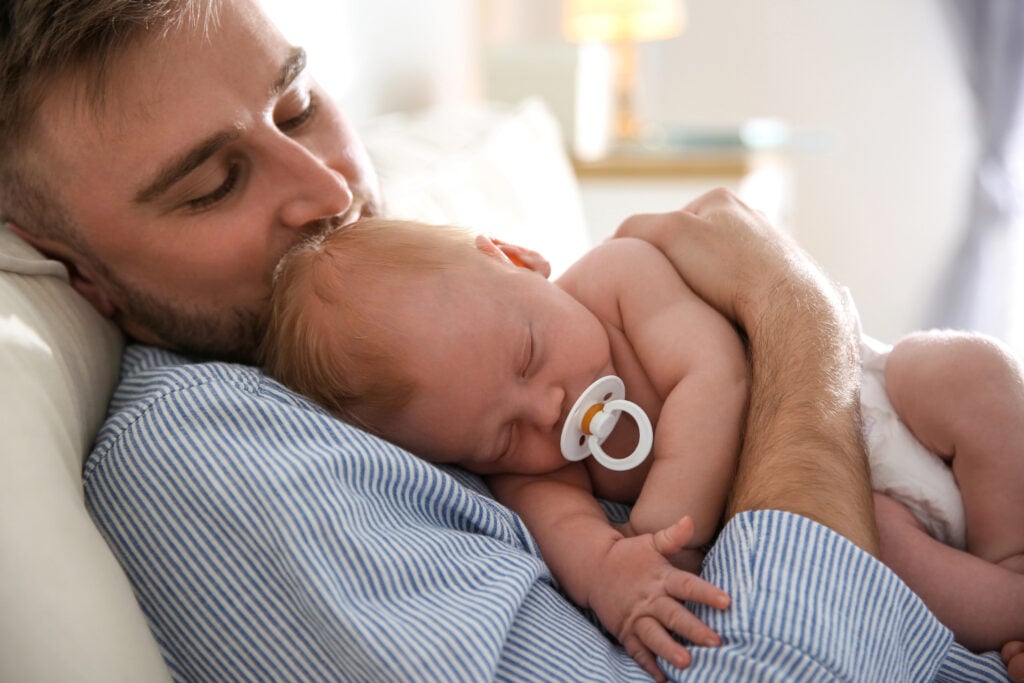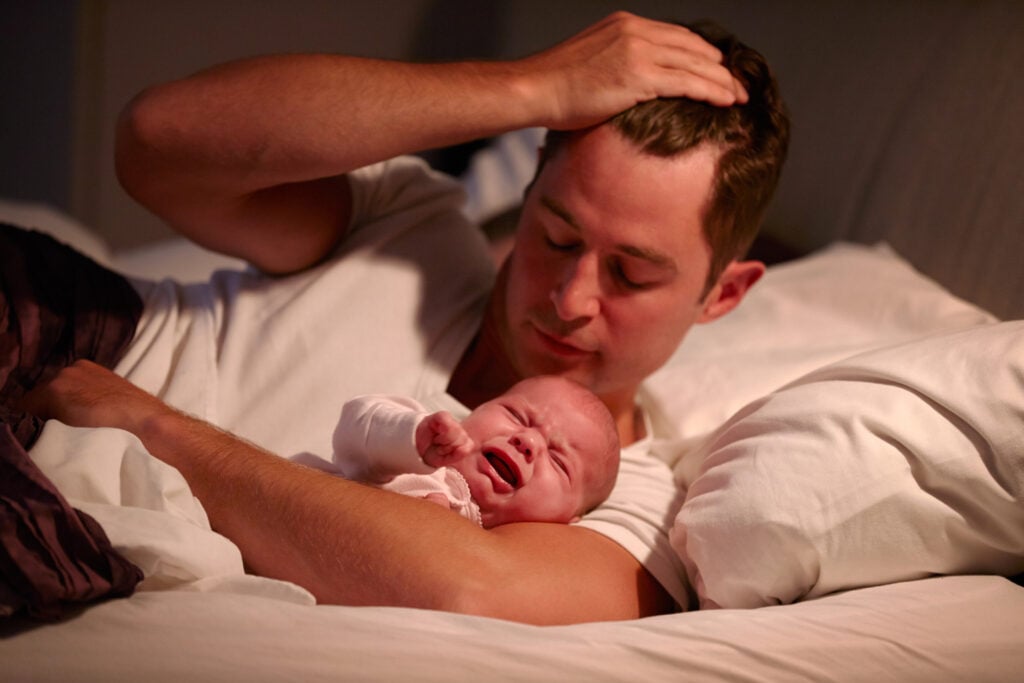
There may be a significant social divide in parenting responsibilities, but that doesn’t mean that this division is inevitable or biological.
The imbalance of emotional labor between moms and dads is shifting. Dads now are taking far more active roles in parenting than in previous generations, and there are stand-up (and stand-out) dads in every generation, but there are still some duties that fall much more heavily on moms.
In fact, moms report far more sleep disturbance than dads in the first six years of parenthood, and especially in the first months with a new baby, but the latest studies show that there’s no natural-born inability in men to wake when babies cry.
“Dads Just Sleep Heavier”

Many of us have heard this as though it’s an existential truth, from our mothers, from our friends, even from nurses and pediatricians.
It’s deeply ingrained that waking up with the baby (even if it’s not to nurse) is just something moms do, even if both parents also work, and even if the mom is also responsible for the bulk of daytime childcare.
If you spend much time at all listening to new moms talking about their experiences, asking for advice, venting, and sharing, whether it’s in person among friends, in online forums, or even in advice columns, you’ll encounter the same complaint in a variety of forms:
“My husband can’t hear the baby monitor, even when it’s on his side.”
“My husband says he’ll take a turn with the baby, but he doesn’t wake up when she cries, and it’s easier to get up with her myself than to wake him.”
“My husband and I are disagreeing about how to balance night feedings.”
The answers roll in. Inevitably, a lot of replies will claim that men just aren’t biologically wired to wake up when their babies cry, and others will place the responsibility on the mother, assuring her it’s her responsibility to wake her husband to take his turn at night parenting.
How much is this affecting parental well-being? One study in 2021 found that mothers reported about four times as much sleep loss per night compared to fathers (on average, 62 minutes compared to 13) in the first three months postpartum, and the disparity continues to some degree through a child’s 12th year.
Brain Imaging Shows Dads Do Hear, Then They Dismiss The Sound
Okay, women are more likely to react to the quietest sounds, but only by a slim margin, according to the study published by the American Psychological Association. They’re 14% more likely to hear whisper-level sounds during sleep.
Once the sound volume is increased, men and women wake equally, but women are three times as likely to get up and check on the baby.
The study found “some evidence for equal sharing” in 23% of the couples in the dataset.
Overall, though, the data seems to indicate that while men and women both hear the sounds an infant makes when waking in the night, in most households, the mother gets up and handles the situation, while the father goes back to sleep.
Biology, Or Socialization?

In a species that nurses its young, it’s understandable that there would be some normalization of the nursing parent taking the primary caregiver role, including through the night.
However, that doesn’t hold up when society has had baby formula and breast pumps for generations, and when the sleep disruption disparity continues long past nursing age. If the disparity was built on feeding needs, the difference wouldn’t persist as children are weaned off of nighttime feedings, and certainly not into school age!
That 23% of households where the nighttime split is more equitable also helps prove that this role doesn’t have to be gendered.
Moms do a majority of the nighttime parenting, but that doesn’t have to be the case.
Is This A Blame Thing?
It’s easy (especially when you’re overtired and maybe a little frustrated with other incidents of weaponized incompetence) to read this study’s conclusions as a condemnation of male parenting.
To do so, however, is an oversimplification that does further injustice to parents of any gender and to their children.
Instead, what we can take from the study is that dads are capable of stepping up and sharing the parenting duties at night. Some of them are already doing it.
Just because dads sleeping through the night while moms keep juggling 24-hour parenting duty has become a norm, doesn’t mean that it has to stay that way.
It starts with changing our expectations, and how we talk about parenting and childcare — and yes, we need more dads to step up.
Every family will have to develop their routines, and this will include factors like work schedules, the needs of other children, and individual abilities. The goal, though, is that one parent doesn’t end up shouldering an imbalanced portion of the invisible work, or of the sleep deprivation — and the science says that goal is achievable.

